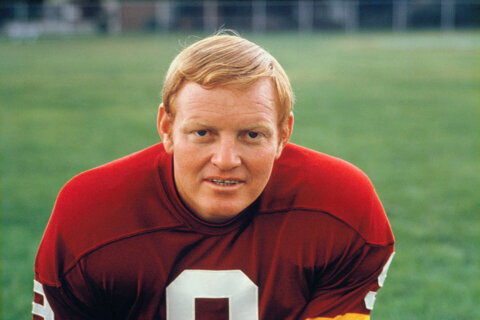WASHINGTON — History’s worst reality show, otherwise known as the 2016 presidential election, took an unexpected turn into the world of sports last week, when Republican nominee Donald J. Trump equated remarks he made in 2005 to “locker room talk.” He doubled down on that characterization in Sunday night’s town hall debate.
I’m not interested in discussing any of the other noise surrounding this, just the remarks themselves, what they really mean, how they were characterized, and what they are meant to say about men. If you’re reading this, you likely already know what they were. If you don’t, you can catch up here before continuing.
Editor’s note: The following video contains graphic language:
Even if Trump’s remarks were hypothetical and not descriptions of actual actions Trump took, they were descriptions of sexual assault (he denied any criminal action when pressed multiple times by debate moderator Anderson Cooper Sunday night). The dismissal of the remarks as simply “locker room talk” suggests that talking about this is normal male behavior behind closed doors.
Others have already written about the conversations they have had with athletes about this false equivalency. Both Sally Jenkins and Cindy Boren wrote pieces for The Washington Post about the issue Monday, detailing their own conversations with athletes, as well as general reaction from around the sports world. Perhaps unsurprisingly, the most common backlash in the comments to their stories came from males explaining to them that men do, in fact, speak this way when no women are around, and that “locker room talk” really just refers to any time when, as the outdated phrase goes, boys are simply being boys.
First of all — no. In the six years before I came to WTOP, I worked for four different professional baseball organizations and was in the locker room dealing with players every day. I lived in Chicago, San Antonio, Central California and Washington — four very different places in this country with variant social norms. I worked everywhere from Double-A to the Major Leagues, with athletes ranging from 19 to nearly 40. I never, at any point, under any circumstance, heard anyone say anything close to this. And this doesn’t simply apply to our shared locker room workplace.
I’ve had beers with players away from the ballpark, off the clock, so don’t tell me it’s really code for “bar talk.” I’ve golfed with them, so don’t tell me it’s “golf course talk.” Also, I was in a fraternity in college. Between all these bastions of masculinity, I heard plenty of bawdy tales and jokes that those now-grown men would be embarrassed to admit in front of their wives or kids. But nothing like that.
This argument, that “men do speak like Trump,” is the most insulting defense of all. Do they? Are they your friends? Your family? Because I have never heard anyone brag about sexual assault, be they my teammates, my co-workers, or my fraternity brothers. But perhaps you have.
Were you aware that they, like Trump, were describing criminal activity? Did you say anything about it? Did you do anything about it? Would you now?
Ultimately, what Trump’s deflection is saying is that every man actually thinks it’s OK to do and say the things he says and does. There are, no doubt, some men who agree with him. That doesn’t excuse what he said in any way — it simply highlights how pervasive the problem still is, even in 2016. But as someone who actually has spent a lot of time in the places Trump says these conversations regularly happen, I can tell you that it is not normal, or common, or generally accepted.
But hey, don’t take it from me — listen to the wide-ranging responses from all walks of the sports world.
CJ McCollum — an NBA player who grew up in Ohio, went to college in Pennsylvania, and plays professionally in Oregon.
I haven't heard that one in any locker rooms https://t.co/Ci8NXOgFcI
— CJ McCollum (@CJMcCollum) October 10, 2016
Sean Doolittle — a Major League Baseball pitcher who grew up in South Dakota, went to college in Virginia, and plays in California.
As an athlete, I've been in locker rooms my entire adult life and uh, that's not locker room talk.
— Obi-Sean Kenobi Doolittle (@whatwouldDOOdo) October 10, 2016
Chris Conley — an NFL player who was born in Turkey to a US military family, grew up and went to school in Georgia, and plays in Kansas City.
Just for reference. I work in a locker room (every day)… that is not locker room talk. Just so you know…
— Chris Conley (@_flight17_) October 10, 2016
Professional athletes certainly aren’t perfect. The domestic violence cases that have come to light the past few seasons, particularly in the NFL, have shined a spotlight on what is still a very real issue. But to imply that rape culture is accepted by all men when behind closed doors is insulting to those of us everywhere who do not agree, who do not condone or make apologies for criminal behavior.
Maybe you still believe this is the standard of male behavior behind closed doors. If you find yourself still wanting to defend those words as normal, commonplace, or acceptable, do me a favor. Instead of jumping into the comments to deflect, or justify, or talk about anything else that does not have to do with what was actually said, instead ask yourself: Why?







